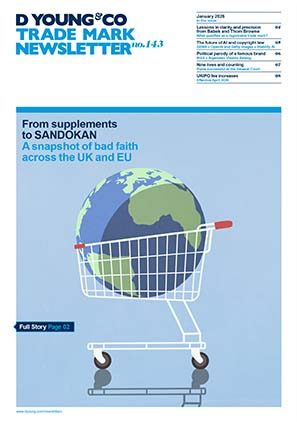Tattoo artist can't stop identical trading name
A recent IPEC decision confirms evidence of deception and resulting damage is imperative to substantiate a passing off action. This is a passing off action brought by tattoo and visual artist Henry Martinez against a cactus shop under the identical trading name “Prick”.
Background
The claimant, Mr Martinez, is a well known tattoo artist, famed for applying tattoos to numerous celebrities including Amy Winehouse and her iconic “Cynthia” tattoo of a pin-up girl. Mr Martinez runs his tattoo and piercing business under the name of Prick Studios, which began trading in 2001 in London. Aside from the tattoo parlour, Mr Martinez operates an artists’ studio under the name “Henry Hate Studios”. The defendants are a cactus shop operating under the name “Prick” that opened in July 2016 just over one mile from the claimant’s tattoo parlour.
Court case
The claimants claimed that the defendants use of the word “Prick” amounted to passing off based on extensive use of the terms “Prick”, “Prick Tattoo” or “Prick!”, via the tattoo parlour business premises as well as online and in advertising and marketing campaigns. The claimants also indicated use of the name “Prick” in conjunction with wider visual artistic endeavours by Mr Martinez.
At the initial case management conference (CMC) the judge ordered a split trial to determine two issues:
- Whether the claimant’s goodwill associated with the signs incorporating “Prick” extended beyond the provision of tattoo and piercing services, and if so to what extent; and
- Whether use of “Prick” by the defendants amounted to material misrepresentation.
The claimants set out goodwill had accrued in the “Prick” name in relation to tattoo services as well as artistic design/visual works and merchandise. A point dismissed by the defendants, but the judge disagreed.
The evidence of use presented showed a significant body of the artistic work was tattoo-related and therefore closely linked. As such, the judge found the claimant’s goodwill existing in the use of the “Prick” name was in relation to tattoo and piercing services as well as the wider visual art related use claimed.
Regarding the geographical scope of the goodwill, despite several high profile collaborations with well known brands, it was found these were only brought about due to Mr Martinez’s association with tattooing celebrities at his premises in London. Therefore, the judge concluded the claimant’s goodwill was limited in geographical scope to a local area around the tattoo parlour - and an area covering the location of the defendant’s cactus shop.
Regarding if there had been material misrepresentation, the judge considered the fields of trade, similarities in get-up and actual evidence of misrepresentation.
The judge recalled that in Harrods vs Harrodian School and Stringfellow vs McCain Foods, it was clear where there was no common field of activities between the parties the burden of proving the likelihood of deception and resulting damage was high. The further removed the less likely it is that any member of the public could reasonably be deceived. In this case it was clear there was no common field of activities between the two businesses.
Any dissimilarity in the get-up was highly material to the question of misrepresentation. From a review of the evidence presented it was concluded there was little to nothing in common in get-up between the tattoo parlour and cactus shop.
Whilst it was acknowledged both premises were painted black, the judge found the cactus shop was light, bright, minimalistic and plant-filled as opposed to the “pomp and excess” of the tattoo parlour. The judge was therefore satisfied nothing in the get-up alluded to a connection.
Regarding misrepresentation, the judge considered witness statements and oral evidence by Mr Martinez and four witnesses. The witnesses had all contacted Mr Martinez via his henryhate.com website to indicate confusion with the cactus shop and had a fairly close friendship with Mr Martinez or were a regular customer of the tattoo parlour.
The judge found it was inherently unlikely people well known to the claimant sent similar messages via the website and not directly to Mr Martinez. Therefore, the witness evidence was given limited weight, especially as the witnesses knew Mr Martinez and his business well and did not represent ordinary consumers.
The judge also considered four instances of confusion by people not known to Mr Martinez. However, it was found that two were mere confusion or mis-identification and not deception; one had simply wrongly assumed a connection between the businesses; and one fell into the category of “moron in a hurry” who was deceived but not sufficient to sustain a claim for passing off.
Decision
The judge concluded there was only one potential instance of deception but it would not support an allegation of misrepresentation as he was not satisfied it would damage the claimant’s goodwill in any serious way. Whilst the judge acknowledged even one instance could mean others were potentially at risk of being deceived, when considering all relevant facts he was satisfied use of “Prick” by the defendants did not amount to a material misrepresentation and as such the claimant’s case was dismissed.
In short
Where the field of activity of the defendants is far removed from the claimants, the burden of proving deception and damage is high.
This case also confirms that a finding of material misrepresentation and damage is crucial to successfully claim passing off.
Case details at a glance
Jurisdiction: England & Wales
Decision level: IPEC
Parties: Henry Martinez t/a Prick and Henry Hate Studio & Prick Tattoo Parlour London Limited and Prick Me Baby One More Time Limited t/a Prick
Date: 11 April 2018
Citation: [2018] EWHC 776 (IPEC)
[2018] EWHC 776 (IPEC) - full decision
Martinez (t/a Prick) & Anor v Prick Me Baby One More Time Ltd (t/a Prick) & Anor [2018] EWHC 776 (IPEC) (11 April 2018)
Read more